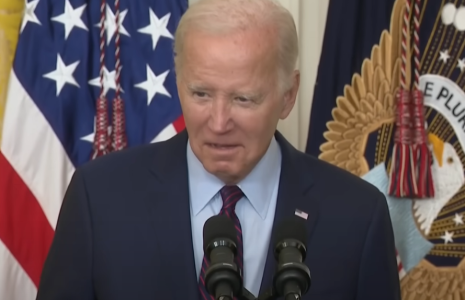Former president’s cancer diagnosis shocks nation
By
- Replies 18
In a development that’s sent shockwaves through the political world and beyond, the former US President has been diagnosed with cancer that has already spread to his bones.
The news, confirmed by his office, has not only raised concerns about his health but also sparked conversations about cancer awareness, treatment options, and the impact of such diagnoses on public figures and their families.
At 82, Joe Biden has long been in the public eye, serving as the oldest president in US history before stepping down earlier this year.
His health has been a topic of discussion for years, with supporters and critics alike scrutinising his every move.
This latest diagnosis comes after Biden experienced urinary symptoms, prompting doctors to investigate further.
A prostate nodule was discovered, and subsequent tests revealed the cancer’s aggressive nature, with a high Gleason score of 9 (Grade Group 5)—the most serious rating for prostate cancer.
While the cancer is described as 'hormone-sensitive,' which allows for more effective management, the fact that it has metastasised to his bones makes it a particularly challenging case.
Biden and his family are currently reviewing treatment options with his medical team.
Despite the often bitter political rivalry between Biden and his predecessor, Donald Trump, the news of Biden’s illness has prompted an outpouring of support.
Trump, who has frequently criticised Biden’s age and mental acuity, put politics aside to wish him a 'fast and successful recovery. '
He also extended warm wishes to Biden’s wife, Jill, and the entire family.
Vice President Kamala Harris, who stepped in as the Democratic nominee after Biden withdrew from the 2024 presidential race, also expressed her support.
'Joe is a fighter,' she wrote, hoping for a full and speedy recovery.
Biden’s diagnosis has put a spotlight on prostate cancer, the most common cancer among men in the United States—and here in Australia, it’s a significant concern as well.
According to the Prostate Cancer Foundation of Australia, about 1 in 6 Australian men will be diagnosed with prostate cancer by the age of 85.
While many cases are slow-growing and highly treatable if caught early, aggressive forms like Biden’s can be life-threatening, especially if they spread beyond the prostate.
Symptoms can include urinary difficulties, blood in the urine, and pain in the hips, back, or pelvis.
However, early prostate cancer often has no symptoms, which is why regular check-ups and PSA (prostate-specific antigen) tests are so necessary for men over 50—or earlier if there’s a family history.
For aggressive, hormone-sensitive prostate cancer, treatment often involves hormone therapy to slow the cancer’s growth, sometimes combined with chemotherapy, radiation, or newer targeted therapies.
While these treatments can be effective in managing the disease and improving quality of life, they are not always curative, especially once the cancer has spread.
Biden’s case highlights the importance of ongoing research and funding for cancer treatments.
Ironically, Biden himself has been a champion for cancer research, leading the 'cancer moonshot' initiative during his time as vice president after losing his son Beau to brain cancer in 2015.
The initiative aimed to accelerate cancer research and improve outcomes for patients worldwide.
Biden’s life has been marked by personal tragedy, from the loss of his first wife and daughter in a car accident to his son’s battle with cancer.
His openness about these experiences has resonated with many, reminding us that cancer doesn’t discriminate—it affects people from all walks of life, including those at the highest levels of power.
For many Australians, Biden’s story may hit close to home.
Most of us know someone who has faced cancer, and the journey can be physically, emotionally, and financially draining.
Support from family, friends, and the wider community is crucial, as is access to quality healthcare and up-to-date information about treatment options.
While Biden is no longer in office, his health remains a matter of public interest, especially given his ongoing influence in American politics and global affairs.
His diagnosis may also serve as a wake-up call for men everywhere to prioritise their health and get regular check-ups.
It’s also a reminder of the importance of supporting cancer research and ensuring that all Australians have access to the best possible care.
With advances in medical science, many cancers that were once a death sentence are now treatable, and survival rates continue to improve.
We know that many members of the Seniors Discount Club community have faced similar battles, either personally or through loved ones.
If you have a story to share, advice for others, or questions about prostate cancer, we encourage you to join the conversation in the comments below.
Your experiences and support can make a real difference to others going through tough times.
In other news, a routine physical exam revealed a small nodule on former president Joe Biden’s prostate, prompting further evaluation.
At 82, Biden has dealt with various health issues in recent years, including past cancer diagnoses and ongoing mobility challenges, raising continued questions about his fitness for office. You can read more about it here.
Credit: YouTube

Have you or someone you know been affected by prostate cancer? What advice would you give to others? Share your thoughts and support below.
The news, confirmed by his office, has not only raised concerns about his health but also sparked conversations about cancer awareness, treatment options, and the impact of such diagnoses on public figures and their families.
At 82, Joe Biden has long been in the public eye, serving as the oldest president in US history before stepping down earlier this year.
His health has been a topic of discussion for years, with supporters and critics alike scrutinising his every move.
This latest diagnosis comes after Biden experienced urinary symptoms, prompting doctors to investigate further.
A prostate nodule was discovered, and subsequent tests revealed the cancer’s aggressive nature, with a high Gleason score of 9 (Grade Group 5)—the most serious rating for prostate cancer.
While the cancer is described as 'hormone-sensitive,' which allows for more effective management, the fact that it has metastasised to his bones makes it a particularly challenging case.
Biden and his family are currently reviewing treatment options with his medical team.
Despite the often bitter political rivalry between Biden and his predecessor, Donald Trump, the news of Biden’s illness has prompted an outpouring of support.
Trump, who has frequently criticised Biden’s age and mental acuity, put politics aside to wish him a 'fast and successful recovery. '
He also extended warm wishes to Biden’s wife, Jill, and the entire family.
Vice President Kamala Harris, who stepped in as the Democratic nominee after Biden withdrew from the 2024 presidential race, also expressed her support.
'Joe is a fighter,' she wrote, hoping for a full and speedy recovery.
Biden’s diagnosis has put a spotlight on prostate cancer, the most common cancer among men in the United States—and here in Australia, it’s a significant concern as well.
While many cases are slow-growing and highly treatable if caught early, aggressive forms like Biden’s can be life-threatening, especially if they spread beyond the prostate.
Symptoms can include urinary difficulties, blood in the urine, and pain in the hips, back, or pelvis.
However, early prostate cancer often has no symptoms, which is why regular check-ups and PSA (prostate-specific antigen) tests are so necessary for men over 50—or earlier if there’s a family history.
For aggressive, hormone-sensitive prostate cancer, treatment often involves hormone therapy to slow the cancer’s growth, sometimes combined with chemotherapy, radiation, or newer targeted therapies.
Biden’s case highlights the importance of ongoing research and funding for cancer treatments.
Ironically, Biden himself has been a champion for cancer research, leading the 'cancer moonshot' initiative during his time as vice president after losing his son Beau to brain cancer in 2015.
The initiative aimed to accelerate cancer research and improve outcomes for patients worldwide.
Biden’s life has been marked by personal tragedy, from the loss of his first wife and daughter in a car accident to his son’s battle with cancer.
For many Australians, Biden’s story may hit close to home.
Most of us know someone who has faced cancer, and the journey can be physically, emotionally, and financially draining.
Support from family, friends, and the wider community is crucial, as is access to quality healthcare and up-to-date information about treatment options.
While Biden is no longer in office, his health remains a matter of public interest, especially given his ongoing influence in American politics and global affairs.
His diagnosis may also serve as a wake-up call for men everywhere to prioritise their health and get regular check-ups.
With advances in medical science, many cancers that were once a death sentence are now treatable, and survival rates continue to improve.
We know that many members of the Seniors Discount Club community have faced similar battles, either personally or through loved ones.
If you have a story to share, advice for others, or questions about prostate cancer, we encourage you to join the conversation in the comments below.
Your experiences and support can make a real difference to others going through tough times.
At 82, Biden has dealt with various health issues in recent years, including past cancer diagnoses and ongoing mobility challenges, raising continued questions about his fitness for office. You can read more about it here.
Credit: YouTube
Key Takeaways
- Former US president Joe Biden has been diagnosed with an aggressive, advanced form of prostate cancer that has spread to his bones.
- The cancer appears to be hormone-sensitive, and Biden’s family is currently reviewing treatment options with his doctors.
- Political figures, including Donald Trump and Kamala Harris, have publicly expressed their support and well-wishes for Biden’s recovery.
- Biden has a history of health issues and personal tragedy and has been a prominent advocate for cancer research, especially following the death of his son Beau Biden from brain cancer in 2015.
Last edited by a moderator:








